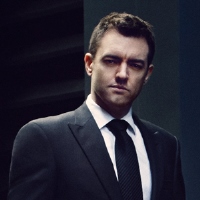Alex Hammond (BA(Hons) 1998/ LLB 2001)
28 August 2015

Author/Novelist
Alex Hammond graduated from Melbourne Law School in 2001. After working for several high profile law firms he left the profession to pursue a career as a novelist. He has written two legal thrillers, Blood Witness (2013) and The Unbroken Line (2015) which follow the life of fictional Melbourne criminal lawyer Will Harris.
MLS spoke to Mr Hammond following the launch of his latest book in late July 2015.
Tell us where in the world you are now and what you have been working on in the past week.
I'm living in Melbourne and working at RMIT University as the Web Manager for the College of Science, Engineering and Health. That's my profession. My vocation is my writing and I've spent the past week working on promoting my latest novel in press interviews. I also gave feedback to my agent around the copyright terms of a screenwriting contract a producer sent through to me so no matter how far I've strayed from the law it still comes in handy.
What is it about modern legal practice that makes it fertile ground for fiction?
Conflict. It's always been at the heart of the law two opposing points of view competing for an outcome but within modern legal practice it feels that so much of this now plays out in the public arena and with instantaneous criticism and commentary. This is a natural fit for dramatic storytelling. I think in many ways my books are about exploring legal ethics which heightens the dramatic impact is the law always just, can it truly be said to be without bias?
What first attracted you to study law at Melbourne University?
I loved the campus, the law quad in particular. I'd like to say that Melbourne's status as the leading law school wasn't part of it, but it was. I was very competitive. When I followed up with my high-school careers counsellor he said it was very difficult, almost impossible to get into law at Melbourne. Then it became a case of wanting to prove him and the other naysayers wrong. Not the most honourable motivation, I'll admit, but it's what got me through.
What is your best or most significant memory of your time at the Melbourne Law School?
Those open book exams. On one occasion a student arrived lugging in a bar fridge filled with his notes and bottled water. The exams themselves were a whole other thing – I distinctly got the impression that sometimes they were deliberately constructed with artful red herrings. If you got led astray with one of those you were in some serious trouble. You didn't have enough time to go back and start the question over, you just had to push forwards and show your reasoning and a correct application of the law. Those exams were tough but rewarding if you managed to pull off a good mark.
What did you expect to do when you graduated from Melbourne Law School? Has your career followed your expectations?
Not at all. My expectations of a career path within the law were a little unrealistic. I had my heart set on graduating and going straight into criminal law, but I ended up working discovery on a huge insurance law class action. I wasn't passionate about the work so after a year or so I left. Writing about a criminal lawyer is perhaps the perfect wish fulfillment. I can cherry-pick the cases, focus on the aspects of the law that interest me and exaggerate it all under dramatic licence.
The Law School now offers the subject 'Law and Literature'. What literature inspired you to write legal fiction?
The very first version of my debut novel, Blood Witness, was an attempt to write a research mystery in the vein of Donna Tartt's The Secret History, a lawyer trying to uncover an old, legal precedent to use in a trial. But as I learnt more about the publishing world I rewrote the book into a crime novel drawing on the likes of Thomas Harris, Dennis Lehane and Martin Cruz Smith. As evidenced by this list it'd be fair to say I'm an American-ophile when it comes to my crime fiction.
What advice would you give to students or practising lawyers looking to turn a passion for writing into a profession?
Unfortunately gone are the times where you can break through on "what you feel like writing". Now it's about knowing the marketplace. Figuring out what makes a book successful is just as important as being able to write well. Law students and graduates are well placed to do this, I think, because they're trained to be analytical.
Mr Hammond's latest novel The Unbroken Line is available now through Penguin Books.